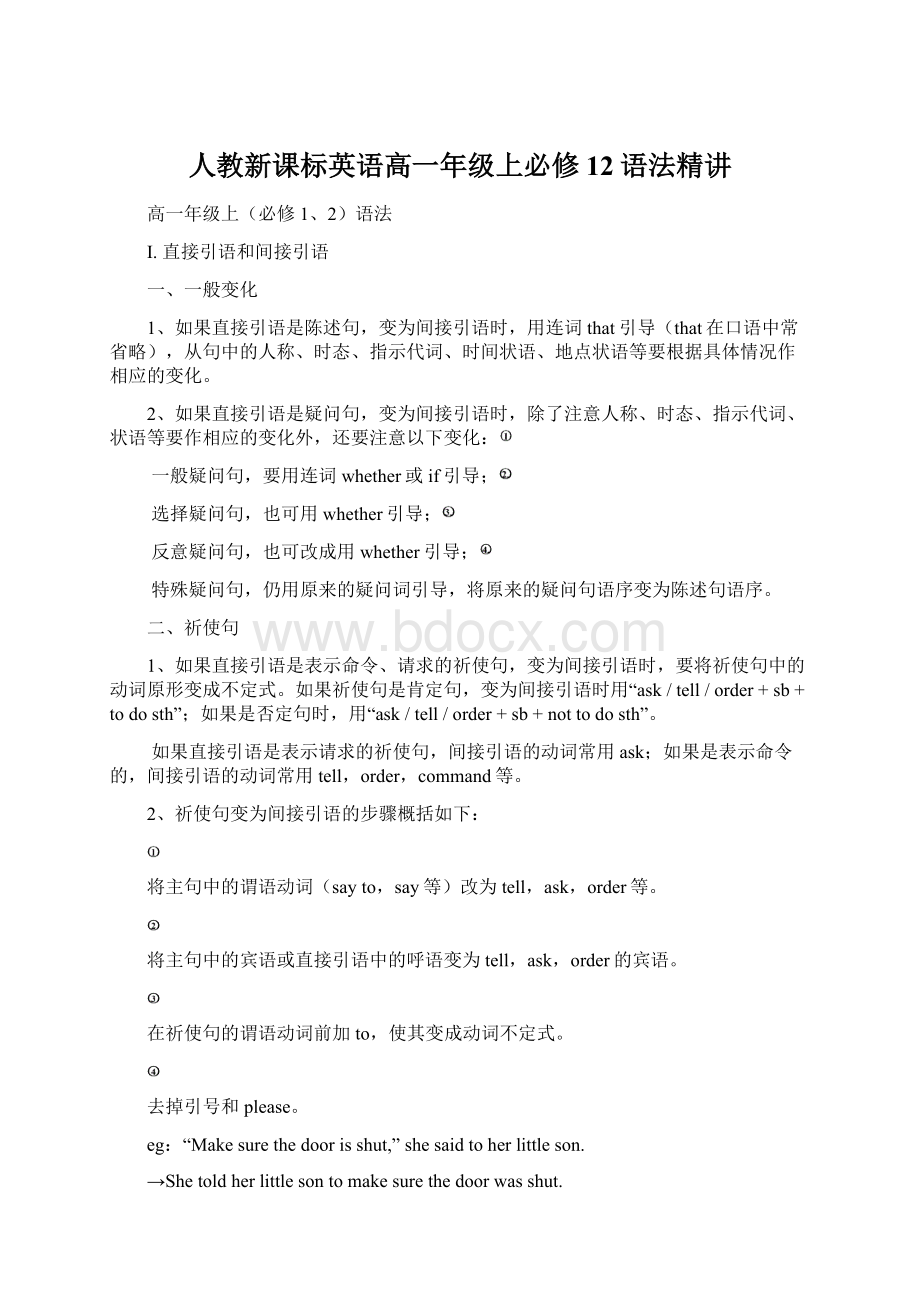人教新课标英语高一年级上必修12语法精讲.docx
《人教新课标英语高一年级上必修12语法精讲.docx》由会员分享,可在线阅读,更多相关《人教新课标英语高一年级上必修12语法精讲.docx(24页珍藏版)》请在冰豆网上搜索。

人教新课标英语高一年级上必修12语法精讲
高一年级上(必修1、2)语法
Ⅰ.直接引语和间接引语
一、一般变化
1、如果直接引语是陈述句,变为间接引语时,用连词that引导(that在口语中常省略),从句中的人称、时态、指示代词、时间状语、地点状语等要根据具体情况作相应的变化。
2、如果直接引语是疑问句,变为间接引语时,除了注意人称、时态、指示代词、状语等要作相应的变化外,还要注意以下变化:
一般疑问句,要用连词whether或if引导;
选择疑问句,也可用whether引导;
反意疑问句,也可改成用whether引导;
特殊疑问句,仍用原来的疑问词引导,将原来的疑问句语序变为陈述句语序。
二、祈使句
1、如果直接引语是表示命令、请求的祈使句,变为间接引语时,要将祈使句中的动词原形变成不定式。
如果祈使句是肯定句,变为间接引语时用“ask/tell/order+sb+todosth”;如果是否定句时,用“ask/tell/order+sb+nottodosth”。
如果直接引语是表示请求的祈使句,间接引语的动词常用ask;如果是表示命令的,间接引语的动词常用tell,order,command等。
2、祈使句变为间接引语的步骤概括如下:
将主句中的谓语动词(sayto,say等)改为tell,ask,order等。
将主句中的宾语或直接引语中的呼语变为tell,ask,order的宾语。
在祈使句的谓语动词前加to,使其变成动词不定式。
去掉引号和please。
eg:
“Makesurethedoorisshut,”shesaidtoherlittleson.
→Shetoldherlittlesontomakesurethedoorwasshut.
Hesaidtothegirl,“Doitatonce.”→Hetoldthegirltodoitatonce.
“Pleasesingatourparty,Mary.”Mrs.Hillsaid.→Mrs.HillaskedMarytosingattheirparty.
Shesaidtome,“Don’tsmokeintheclassroom.”→Shetoldmenottosmokeintheclassroom.
3、表示建议、劝告的祈使句,在变为间接引语时,可用“suggest+动名词”或“suggest+thatsb/sth(should)do”结构。
这种用法在let祈使句中最为常见。
eg:
Hesaid,“Let’sleavethecoatsathome.”→Hesuggestedourleavingthecoatsathome.
→Hesuggestedthatwe(should)leavethecoatsathome.
语法专练:
将下列直接引语变为间接引语
1.Hesaid,“Iamgoingtoseeafilmthisafternoon.”
2.Heaskedme,“WhenwillyougotoBeijing?
”
3.Tomsaidtome,“IwenttoNewYorklastmonth.”
4.Jacksaidtome,“Ihavewaitedforyouforalongtime.”
5.Heaskedme,“Areyoufondoffootball?
”
6.Theteacheraskedhim,“Whatdidyoudolastnightandwhendidyougotobed?
”
7.Heaskedtheboy,“Whywereyoulateagain?
”
8.Iaskedher,“Doyouliveintheschool?
”
9.Theteacheraskedus,“Stoptalking,pleaseandhandinyourexercisebooks.”
10.TheteachersaidtoLiPing,“Turnoffyourrecorder.”
11.TheteachersaidtoLiPing,“Don’tlistentothetapeinclass.”
12.Themothersaidtheboy,“Don’tplayfootballinthestreet.”
13.Hislittlesistersaid,“Whynotgotothecinema?
”
14.“Speaklouder,please,”hesaidtoher.
15.“Don’twaitforme,”hesaidtothem.
16.“Canyoutellmeastory?
”thegirlaskedherfather.
Ⅱ.现在进行时
现在进行时是表示最近的、将来的安排、计划或打算。
如arrive,come,drive,fly,go,leave,start,travel,stay,remain等。
一、现在进行时的基本用法
1、表示现在(指说话人说话时)正在发生的事情。
eg:
WearehavingourEnglishclass.
2、表示现阶段暂时的情况,说话时动作未必正在进行。
eg:
Mr.Liiswritinganothernovel.(说话时并未在写,只处于写作的状态)
3、表示发展中的或正在改变的情况,常这样用的动词有:
get,grow,become,turn,run,go,begin等。
eg:
Theleavesareturningred.
It’sgettingwarmerandwarmer.
4、与always,constantly,forever等词连用,表示反复发生的动作或持续存在的状态,往往带有说话人的主观色彩(赞成、讨厌、生气等情绪)。
eg:
Youarealwayschangingyourmind.
二、现在进行时表示将来
用现在进行时表示将来,指的是近期的、按计划或安排要发生的动作,谓语通常为瞬间性的动词,如come,go,arrive,leave,start,begin,return,meet,get等。
但在现代英语中,有相当多的动态动词都可用现在进行时表示将来。
这种句子通常有一个表示将来的时间状语。
eg:
They’releavingforHongKongthisafternoon.
Heiswritingtoyoutomorrow.
IamspendingmyholidayinSwitzerlandthisyear.
三、表示将来的动作或状态的其他形式
1、will/shall+动词原形:
单纯表示将来的动作或状态。
eg:
Shewillbeagoodwifeandmotherwhenshegetsmarried.
2、begoingto+动词原形:
表示即将发生的或最近打算进行的事。
eg:
Areyougoingtothepartythisevening?
3、beto+动词原形:
表示按计划要发生的事或征求对方意见。
eg:
Arewetogoonwiththisproject?
4、beaboutto+动词原形:
表示即将发生的动作,不与表示将来的时间状语连用。
eg:
Iwasabouttogoswimmingwhenmyguideshoutedatmeandtoldmenottodoso.
5、一般现在时代替一般将来时。
when,while,before,after,till,once,assoonas,solongas,bythetime,if,incasethat,unless,evenif,themoment,theminute,theday,theyear,immediately,theinstant等引导的时间状语从句、条件句中,用一般现在时代替将来时。
eg:
HeisgoingtovisitherauntthedayhearrivesinBeijing.
用于某些简单句中,适用于come,go,leave,begin,start,arrive等动词。
这些动词多表示按照时刻将要如何。
eg:
Whattimedoesthetraingo?
Theplanestartsat10o’clocktomorrowmorning.
语法专练:
1.Becausetheshop,theT-shirtsaresoldathalfprice.
A.hascloseddownB.closeddownC.isclosingdownD.hadcloseddown
2.I’vewonaholidayfortwotoFlorida,Imymum.
A.amtakingB.havetakenC.takeD.willhavetaken
3.Mymoney.ImustgotothebanktodrawsomeofmysavingsoutbeforeIhavenoneinhand.
A.hasrunoutB.isrunningoutC.hasbeenrunoutD.isbeingrunout
4.---Whenwillyouleave?
---Weverysoon.
A.doleaveB.areleavingC.haveleftD.leave
5.---Whenwillyoutellussomethingabouttheweatherthere?
---Itothat.
A.goB.comeC.amgoingD.amcoming
6.HesaidhemeapresentunlessIindoingtheexperiment.
A.hadnotgiven;hadnotsucceededB.wouldnotgive;succeeded
C.willnotgive;succeedD.wouldnotgive;wouldsucceed
7.---leaveattheendofthismonth.---Idon’tthinkyoushoulddothatuntilanotherjob.
A.I’mgoingto;you’dfoundB.I’mgoingto;you’vefound
C.I’ll;you’llfindD.I’ll;you’dfind
8.Sendmyregardstoyourlovelywifewhenyouhome.
A.wroteB.willwriteC.havewrittenD.write
9.Afterlosing$20,000onmylastbusinessventure,Ianychancesthistime.
A.haven’ttakenB.don’ttakeC.amnottakingD.wouldn’ttake
10.Youthingsabout.Look,whatamessityourroom?
A.arealwaysthrowingB.havealwaysthrownC.alwaysthrowD.havealwaysbeenthrowing
Ⅲ.定语从句
定语从句在复合句中修饰一个名词或代词。
被定语从句修饰的名词或代词叫做“先行词”。
引导定语从句并作定语从句中的一个成分的词叫做“关系词”。
常见的关系词有关系代词(who,whom,whose,that,which等)和关系副词(when,where,why等)。
关系词有两个作用:
1、放在先行词与定语从句中间起连接作用,引导定语从句;2、代替先行词在其引导的定语从句中充当一定的句子成分,并与先行词保持数的一致。
关系代词引导的定语从句
一、关系代词及其作用一览表
关系词
先行词
从句成分
例句
备注
关
系
代
词
who
表人的词
主语
Doyouknowthemanwhoistalkingwithyourmother?
whom,that,which在从句中作宾语时,常可省略;但介词提前是,后面关系代词不能省略,也不可用that。
whom
表人的词
宾语
Mr.LiisthepersonwithwhomIamworking.
Thyboy(whom)sheloveddiedinthewar.
whose
表人或物的词
定语
Ilikethosebookswhosetopicsareabouthistory.
Theboywhosefatherworksabroadismydeskmate.
that
表人或物的词
主语或宾语
Aplaneisamachinethatcanfly.
Sheisthestar(that)Iwanttoseeverymuch.
which
表物的词
主语或宾语
Thebook(which)Igaveyouwas.
Thepicturewhichwasabouttheaccidentwasterrible.
as
表人或物的词
主语或宾语
Heissuchapersonasisrespectedbyallofus.
ThisisthesamepenasIlostyesterday.
作宾语一般不省略。
二、关系代词特殊用法一览表
情况
用法说明
例句
只用
that的情
况
1、先行词为all,everything,anything,nothing,little,much等不定代词时;
2、先行词被all,any,every,each,much,little,no,some,few等修饰时;
3、先行词有形容词最高级或序数词修饰时
4、先行词既指人又指物时;
5、先行词被theonly,thevery修饰时;
6、先行词位于以who或which引导的特殊疑问句式的主句中时;
7、关系代词在定语从句中作表语时。
1.Hetoldmeeverythingthatheknows.
2.Allthebooksthatyouofferedhavebeengivenout.
3.ThisisthebestfilmthatIhaveeverseen.
4.Wetalkedaboutthepersonandthingsthatweremembered.
5.HeistheonlymanthatIwanttosee.
6.Whoisthemanthatismakingaspeech?
7.Whichisthebookthatyoulikebest?
只用
which
who
whom
的情
况
1、在非限制性定语从句中,只能用which指物;用who/whom指人;
2、在由“介词+关系代词”引导的定语从句中,用which指物,whom指人;
3、先行词本身是that时,关系词用which,先行词为those,one,he时用who。
1.Hehasason,whohasgoneabroadforfurtherstudy.
2.Ilikethepersontowhomtheteacheristalking.
3.Thosewhorespectothersareusuallyrespectedbyothers.
语法专练:
Ⅰ.用that,which,who,whom或whose填空
1.Istillremembermyfirsthistoryteacherlessonwerelivelyandinteresting.
2.Theboyswantedtoplayfootballweredisappointedwhenitrained.
3.ItwasameetingimportanceIdidnotrealizeatthattime.
4.It’safamilyofeightchildren,allofarestudyingmusic.
5.Doyoustillrememberthedayswespenttogetherlastsummervacation?
6.hadbeenexpected,theEnglandteamwonthefootballmatch.
7.Thisisthemostexpensivebookissoldinthisshop.
8.Doyouagreewitheverythinghesaidatthemeeting?
9.Beijingwasattackedbysuchaterriblesandstormfewcitizenshadeverexperiencedbefore.
10.Thisistheonlyshopsellsthiskindofmachine.
Ⅱ.单项选择
1.Thereisaboydownstairswantstoseeyou.
A.whoB.whomC.whichD.he
2.Wetalkedaboutthethingsandpersonshesawinthepark.
A.whichB.whatC.whoseD.that
3.Thefiredestroyedwasinthebuilding.
A.allB.allthatC.thatD.which
4.Lookout!
Don’tgettooclosetothehouseroofisunderrepair.
A.whoseB.whichC.ofwhichD.that
5.Womendrinkmorethantwocupsofcoffeeadayhaveagreaterchanceofhavingheartdiseasethanthosedon’t.
A.who;/B./;whoC.who;whoD./;/
6.Theirgoodsareexchangedforsuchmachineryandequipmentweneedtobuyabroad.
A.thatB.whatC.asD.which
7.Ourconcertturnedouttobeagreatsuccess,theyhadneverexpected.
A.whatB.thatC.whenD.which
8.RecentlyIboughtanancientChinesevase,wasveryreasonable.
A.whichpriceB.thepriceofwhichC.itspriceD.thepriceofwhose
9.Thisistheonlyanswerright.
A.whichwethinkisB.whatwethinkitisC.thatwethinkisD.whatwethinkseems
10.ThisisthecityIlivedintwoyearsago.
A.whichB.whatC.whereD.as
Ⅳ.关系副词when,why,where,“介词+关系代词”引导的定语从句
一、关系副词when,why,where及其作用一览表
关系词
先行词
从句成分
例句
备注
关
系
副
词
when
表时间的
词
作时间状语
Iwillneverforgetthedaywhenwemetthere.
可用onwhich
where
表地点的
词
作地点状语
ThisisthehousewhereIwasborn.
可用inwhich
why
表原因的词
作原因状语
Ican’timaginethereasonwhyheturneddownmyoffer.
可用forwhich
二、关系副词引导的定语从句
1、关系副词when,why,where引导的定语从句
when在定语从句中表示时间,作时间状语,其先行词是表示时间的词,如:
time,moment,month,day,year等。
eg:
Doyourememberthedaywhenyourboyfriendwasborn?
Sundayisaholiday,whenpeopledonotgotowork.
where在定语从句中表示地点,作地点状语,其先行词是表示地点的词,如:
school,house,place,village等。
eg:
ShelivedinRomeforacoupleofyears,whereshetaughtEnglish.
Thisisthefactorywhereourpresidentusedtowork.
注意:
有些先行词虽不表示具体的地点,但表达一种“阶段、境地、形势、地步”,也可用where来引导定语从句。
如